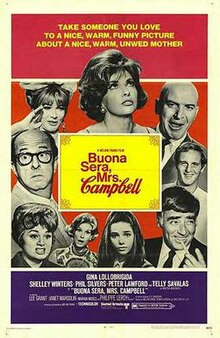Buona Sera, Mrs. Campbell
| Buona Sera, Mrs. Campbell | |
|---|---|
 Original poster | |
| Directed by | Melvin Frank |
| Written by | Melvin Frank Denis Norden Sheldon Keller |
| Produced by | C.O. Erickson (executive producer) Melvin Frank (producer) |
| Starring | Gina Lollobrigida Phil Silvers Peter Lawford Telly Savalas Shelley Winters Lee Grant Janet Margolin |
| Cinematography | Gábor Pogány |
| Edited by | Bill Butler |
| Music by | Riz Ortolani |
| Distributed by | United Artists NBC |
Release date | December 1968 |
Running time | 108 minutes |
| Country | USA |
| Language | English |
Buona Sera, Mrs. Campbell is a 1968 American comedy film directed by Melvin Frank, who co-wrote the original screenplay with Denis Norden and Sheldon Keller.
The United Artists release was filmed at the Cinecittà Studios in Rome. It served as the basis for the unsuccessful 1979 stage musical Carmelina and the plot of the enormously successful stage musical Mamma Mia! and its 2008 movie version.[citation needed]
Plot
The title character, Carla "Campbell", is an Italian woman who—during the American occupation of Italy—slept with three American GIs (a Corporal, a Sergeant, and a Lieutenant) in the course of ten days. By the time she discovers she is pregnant, all three have moved on and she, uncertain of which is the father, convinces each of the three—who are unaware of the existence of the other two—to financially support "his" daughter, Gia.
To protect her reputation, as well as the reputation of her unborn child, Carla has raised the girl to believe her mother is the widow of an army Captain named Campbell, a name she borrowed from a can of soup (she is very fond of Campbell's soups).
The film opens twenty years after the end of World War II service, and the three men (accompanied by their wives, and in the Newmans' case three obnoxious children) attend a unit-wide reunion in the village they liberated. Carla is forced into a series of comic slapstick situations as she tries to keep them - each one anxious to meet his daughter for the first time - from discovering her secret, while at the same time trying to keep Gia from running off to Rome to be with a much older married man.
When confronted Mrs. Cambell claims she doesn't know who the father is having been with all three men in the space of ten days. She challenges them what kind of fathers they would have been, never having been there for all the small but important life events of their daughter, and her about to run away to Brazil with an older man. Provoked by this each of fathers talk to Gia and insist she cannot run off with a married man. The fathers cease the maintenance payments and the Braddocks who cannot have children of their own agree to take care of Gia while she studies in the US.
This section needs expansion. You can help by adding to it. |
Cast
- Gina Lollobrigida as Carla Campbell
- Phil Silvers as Phil Newman
- Peter Lawford as Justin Young
- Telly Savalas as Walter Braddock
- Shelley Winters as Shirley Newman
- Lee Grant as Fritzie Braddock
- Janet Margolin as Gia Campbell
Musical score
The score was composed by Riz Ortolani. The title song, with music by Ortolani and lyrics by screenwriter/director Frank, was performed by Jimmy Roselli. Andrew Frank wrote the lyrics and music for the "San Forino March." A soundtrack album was released by United Artists Records.
Critical response
In his review in the Chicago Sun-Times, Roger Ebert described the film as "a charming reminder of what movie comedies used to be like . . . It depends on the traditional strong points of movie comedy: well-defined situation, good dialog, emphasis on characters . . . director Melvin Frank holds the story together and makes it work. A lot of the credit goes to the real comic ability of Telly Savalas (the best of the three would-be fathers) and Shelley Winters, who plays Phil Silvers' wife. Miss Lollobrigida is good, too, projecting the kind of innocence that is necessary if the situation isn't going to seem vulgar." [1]
In the New York Times, Howard Thompson stated, "This overcooked, hardbreathing frolic, which gets off to a bright start, eventually collapses in the category of impossible comedies, sniggeringly pegged to sex . . . the reasonable taste, the bounce and the logic all start floundering about midpoint, with everyone running wildly to catch up, including poor Miss Lollobrigida, who bears the brunt of the confusion and the redundant contrivances. Suddenly it's gags, gags and more gags, to no avail, until the plot peg of authentic paternity begins to sound like a tired, old burlesque joke. The finale is as dull as the opening chapter is sprightly." [2]
Awards and nominations
- Golden Globe Award for Best Motion Picture Actress in a Musical or Comedy (Gina Lollobrigida)
- Golden Globe Award for Best Original Song ("Buona Sera, Mrs. Campbell")
- Writers Guild of America Award for Best Written American Original Screenplay
- David di Donatello for Best Actress (Gina Lollobrigida), winner
